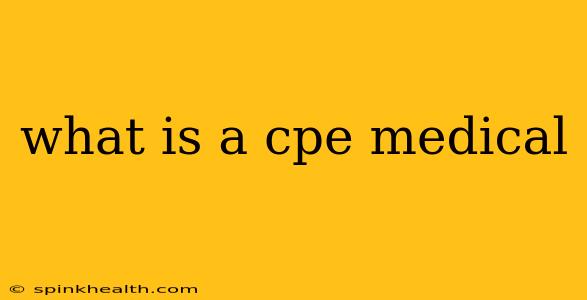What is a CPE Medical? Unraveling the Mystery of Continuing Professional Education
The term "CPE medical" might sound a bit mysterious at first glance. It's not a specific medical procedure or device, but rather a crucial aspect of maintaining professional competence in the healthcare field. Let's unravel the meaning behind CPE medical, exploring its significance and answering some common questions.
Imagine a world where doctors, nurses, and other healthcare professionals never updated their knowledge or skills after graduating. The rapidly evolving landscape of medicine demands continuous learning to ensure patients receive the safest and most effective care. This is where CPE medical comes in. It's all about Continuing Professional Education, a process of ongoing learning and development designed to maintain and enhance the skills and knowledge of healthcare professionals throughout their careers.
What does CPE medical involve?
CPE medical encompasses a wide range of activities aimed at improving professional practice. Think of it as a lifelong commitment to learning, not just a one-time event after graduation. These activities can include:
- Conferences and seminars: Attending lectures, workshops, and presentations by leading experts in various medical fields.
- Online courses and webinars: Engaging with interactive learning materials at your own pace, often offering flexibility for busy professionals.
- Journal articles and publications: Staying current with the latest research and advancements through reading peer-reviewed publications.
- Professional development programs: Participating in structured programs designed to enhance specific skills or knowledge areas.
- Mentorship and shadowing: Learning from experienced professionals through observation and guidance.
What are the benefits of CPE medical?
The benefits of CPE medical are numerous and impact both the individual healthcare professional and the wider healthcare system.
- Enhanced patient care: By staying up-to-date with the latest medical advancements, healthcare professionals can provide better diagnoses, treatments, and patient care. This directly translates to improved health outcomes.
- Improved professional skills and knowledge: CPE keeps professionals sharp, expanding their expertise and enabling them to handle complex cases with confidence.
- Increased job satisfaction: Continuous learning can be personally rewarding, fostering a sense of professional growth and accomplishment.
- Meeting regulatory requirements: In many countries, participation in CPE is a mandatory requirement for maintaining professional licensure. This ensures a baseline level of competency across the profession.
- Career advancement opportunities: Demonstrating a commitment to lifelong learning can significantly enhance career prospects and open doors to leadership roles.
How many CPE credits do I need?
The number of CPE credits required varies significantly depending on the healthcare profession, the licensing authority, and the specific country or state. There's no single universal answer. You'll need to consult the licensing board or professional organization for your specific profession to determine the exact requirements. This information is typically available on their official websites.
What types of CPE activities are available?
The range of available CPE activities is incredibly broad, reflecting the diverse nature of the healthcare field. They often focus on specific areas such as:
- Clinical skills updates: Refining techniques in areas such as surgery, diagnostics, or medication administration.
- Ethical considerations: Addressing ethical dilemmas and professional responsibilities in healthcare.
- Technological advancements: Keeping abreast of new technologies and their application in medicine.
- Management and leadership training: Developing skills to effectively lead and manage healthcare teams.
Where can I find CPE medical activities?
Many organizations offer CPE opportunities, including:
- Professional medical associations: These groups often host conferences, webinars, and offer other learning resources.
- Universities and medical schools: These institutions frequently run continuing education programs.
- Online platforms: Numerous online learning platforms provide access to a vast array of CPE courses and materials.
In conclusion, CPE medical is not just a requirement for maintaining licensure; it's a cornerstone of providing high-quality, safe, and effective healthcare. It's an ongoing journey of professional development, ensuring that healthcare professionals remain at the forefront of their field, ultimately benefiting patients and the healthcare system as a whole.

